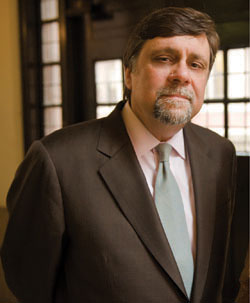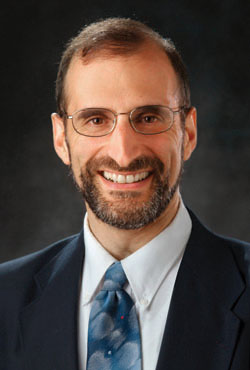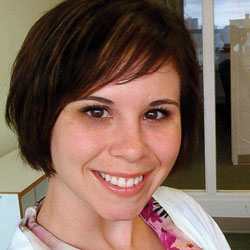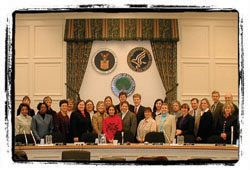Learning to educate the lawmakers
TC's John Allegrante helped inaugurate the National Health Education Advocacy Summit. Now he brings his students there to find their voices
Around Teachers College, John Allegrante is known for giving impromptu architectural and historical tours of the Columbia and TC campuses. But when Allegrante—Professor of Health Education and TC Deputy Provost—takes students in his Social Policy and Prevention course to Washington, D.C., each February, it’s not to check out the Smithsonian or the Library of Congress. Instead, the students are there to advocate for higher funding levels at the U.S. Centers for Disease Control and Prevention (CDC) and other federal agencies.
For the past 11 years, Allegrante has been leading students on these trips to Capitol Hill as part of the National Health Education Advocacy Summit, a two-and-a-half day annual conference to teach advocacy skills to students, faculty and health education professionals. Allegrante co-founded and helped launched the Summit the year he was President of the Society for Public Health Education (SOPHE).
Inspired by Research!America, an advocacy group that helped in the span of a decade to double the funding for the National Institutes of Health, Allegrante and his colleagues at SOPHE and a coalition of national public health organizations were eager to create an equal voice for raising funding levels at the CDC and other agencies involved in school and public health education.
“Within the field, there was a consensus: we needed to have more political impact,” says Allegrante, a SOPHE Distinguished Fellow who recently was named editor-in-chief of Health Education & Behavior, the organization’s flagship peer-reviewed journal.
Scheduled to coincide with the development of the federal budget, the Summit fast became a forum to develop a unified agenda among health education professionals. Over the years, approximately 1,200 professionals have attended, representing 30,000 constituents invested in issues such as tobacco control, adolescent health, diet and physical activity, hypertension and the elimination of health disparities.
Since TC is a professional school that sends its graduates out into the job market, Allegrante says, “It was logical for students to be involved and to expose them to the lawmaking and appropriations process.” They also meet top professionals in the field—including TC alumnus Howell Wechsler, a perennial speaker at the event who is Director of the CDC’s Division of Adolescent and School Health (DASH).
“It’s amazing that students get to spend all day with leaders in the field,” Wechsler says. “But that’s the kind of experience TC has always provided.”
Before the Summit’s creation, Allegrante’s Social Policy course covered three basic areas: U.S. health policy and the role of health promotion and disease prevention; behavioral science perspectives on decision-making and consensus-building; and a primer on economic analysis in health promotion and disease prevention. With the establishment of the Summit, Allegrante added a fourth modular component, on how to be an advocate.
For Katie Hornung ’09, one of the students who participated in the advocacy effort this past February, the Summit was a chance to put an ideal into action. “In school, activism is such a theme,” she says, “but I’d never had a class before that actually taught me how to be an activist.”
Advocating for the appropriation of $48.6 million for DASH programs, Hornung and her colleagues—a group of 12 students—visited an aide at New York Representative Eliot Engel’s office. Speaking to a congressional aide was “nerve-wracking,” Hornung says, but she felt prepared by the previous day of seminars and trainings, which taught her “how to be an educator to lawmakers.”
At the Summit, Hornung learned practical tips such as: keep requests short and concise, since legislators and their aides are busy people, and be specific. Make the request at least twice, preferably at the beginning and end of the time allotted with the lawmaker and/or his or her staff. Instead of overloading requests with facts and statistics, focus on the most compelling reasons for supporting an issue. Personal stories make an especially compelling case and provide lawmakers with specific examples that the rest of their constituency can relate to. Finally, leave contact information and be prepared to serve as an ongoing resource for the lawmaker and his or her staff on this particular issue.
Speaking to an informed aide, Hornung’s group made an impact, even though the aide was already aligned with the students’ view of increased funding for school health programs.
Hornung’s takeaway lesson? “It’s important that citizens feel empowered and take the time to have their voices heard, particularly in a system where the loudest voices tend to be special interest groups and big business.”
Lauren Au ’09, whose group was focused on chronic disease prevention, was able to incorporate her professional experience in a hospital, working with patients with diabetes and obesity. After she explained how her experience was related to the preventive health measures of Function 550 (the federal discretionary budget for health measures), she felt the aide she spoke to was very responsive.
“As students,” she says, “we are able to provide aides with information that they might not otherwise have.”
Allegrante’s pioneering efforts have inspired other programs to include students as well. In fact, since the Summit’s inception, student attendance has increased by 40 percent.
“If you don’t have good leadership,” says M. Elaine Auld, current CEO of SOPHE and Allegrante’s founding partner, “it’s much more difficult to make an impact on students. John always encourages the experience—because it’s transformational.”
Witness Hornung and Au. Hornung benefited so much from the 2009 Summit that she’s planning on attending again this year. Au, who earned her R.D. and M.S. in nutrition and public health, currently uses her advocacy experience at Tufts University’s Friedman School of Nutrition Science and Policy, where she is a USDA Doctoral Fellow in Obesity focusing on Food Policy and Applied Nutrition.
“Having the advocacy experience has been really enriching—here I’m taking classes in policy and government relations. All the work I did in Professor Allegrante’s class and at the Summit has really strengthened my advocacy skills,” says Au.
The collective benefits of the Summit have been substantial. CDC funding levels, while not increasing, have remained constant—no small feat in the current economic climate. In FY10, DASH was slated for a $5-million increase in the President’s budget, but while the House approved the measure, the Senate ultimately rejected it.
“There’s always next year,” Allegrante says.
But to DASH’s Wechsler, the bigger triumph may lie in the empowerment of the students themselves. “They’re given the chance to use information and to have an impact on the nation’s policies,” he says. “That’s education.”
Published Thursday, Apr. 1, 2010



